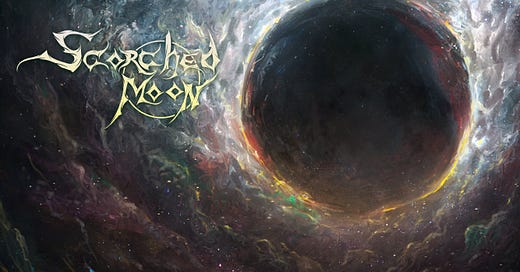(Full disclosure: The guitarist/vocalist in this band, Trapper Lanthier, was one of my best friends in high school; he’s also the reason I’m into metal)
The task of reviewing music made by people I know always feels especially daunting. I say ‘always’, but this is only the second time it’s happened. Still, the anxiety of potentially having to tell somebody I care about that their music is lackluster…
Thankfully, that reality has yet to come true.
Scorched Moon’s sound is rooted in Prog Metal, pulling on a lot of elements from bands like Dream Theater and Ayreon.1 But their sound isn’t as ‘clean’ as those bands often are. Whether they’ve realized it or not, there are some solid sludge elements on display here, as the various lines (especially the vocals) all bleed together in the mix.
That could potentially be a detractor, but the band has found serious cohesion through most of the album. They move in unison, and each song feels driven and intentional as a result — in a way that I don’t typically expect from artists’ debut albums.
And I know for a fact that it took them time to hit this level of sophistication. I was fortunate enough to hear a couple of tracks from them a few years ago, when they were first starting to put out original material. They sounded just as ambitious back then, but there was zero polish; I definitely remember catching a few flats on the vocal lines.
The amount of growth evident in these three short years is astounding.
I should also note that there are elements of Power and Speed Metal present, and when the band hits a breakdown, they go hard. With all of these different elements and influences, the focus is eternally on technicality and cohesion. This means that the melody is frequently out of focus. It’s there, but it’s easy to lose track of. Similarly, there are few or no slick, poppy hooks — not in the guitar line, and certainly not in the vocal line.
This is not introductory-level Metal.
Obsidia is also a sci-fi concept album, featuring epic battles, the defeat of a great, interstellar evil, and more. While the lyrics2 aren’t top-tier, they’re good enough; some lines are campy, some feature great descriptive elements. It’s a mixed bag. The biggest detractor on this front is that the lyrics, themselves, don’t fully explain the story.
That said, the story is still much more accessible than most concept albums — Coheed and Cambria, included. And, reportedly, there is prose (incomplete, it seems, but it exists) which is meant to accompany the album and provide additional details.
Overall, the sci-fi epic elements don’t quite match up to last year’s surprising entry from Dragonland, but it’s still an interesting story with decent execution.
The album remains mostly aggressive and upbeat through the first eight out of nine tracks. Initially, it feels like this is just maintaining tension, and then the fight breaks out, and it just goes hard. Tracks 6-8 form a suite called “The Sleeping Shades”, and the middle track here is an instrumental which seems tailored to illustrate the chaos and destruction of a space battle.
And then the album ends on a mournful ballad called “Doubt”, which is altogether softer and infinitely more melodic than the rest of the album; even with the lighter piano and violin accompaniment, though, the vocals are still intense.
There’s not a bad track here. I think the band still has growing to do; as much as their sound has been refined over the last few years, I think they’ll likely only improve as time goes on. This is a promising start.3
Also, sidenote: this album honestly has one of the coolest covers I’ve seen all year.
Rating: Teal Green
They also cite Coheed and Cambria as an influence, but I don’t hear that so much in the music; that feels more relevant to the subject matter.
These can be found on the band’s BandCamp page - when you mouse over each track, a ‘lyrics’ button will show.
Well done, Trapper!





